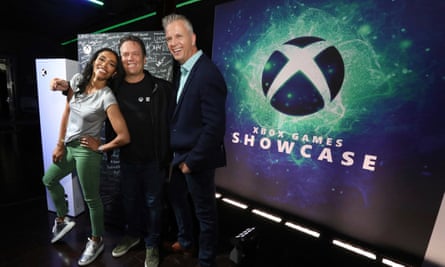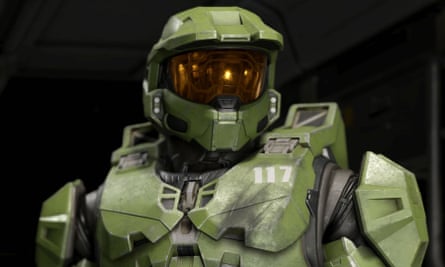Phil Spencer is sitting alone on the stage at the Novo Theatre in downtown Los Angeles. The building is across the street from the empty LA convention centre which, in Junes gone by, would have been the thronging heart of the games industry universe. But that universe has changed irrevocably over the past two years. Things have to be done differently now – the future is uncertain.
Nobody knows that better than Spencer. Earlier today, he’d hosted a live showing of the Xbox 2023 Showcase in this auditorium, the seats packed with members of the Xbox fanbase. It was a raucous two hours of whooping and cheering, but Xbox has ground to make up. “2022 was a light year,” Spencer says, before instantly checking himself. “That’s kind of a positive way to put it.”
A few weeks ago, he gave a downbeat interview to the Kinda Funny podcast, in which he referred to Xbox as being third in the console market and poured scorn on the idea that a perfect Starfield game could convert PS5 owners to Xbox. A few skeptics saw this as his way of hitting back at the regulators stalling Microsoft’s purchase of Activision, calling it anti-competitive. Others saw in it the honesty he’s always tried to bring to his comms.
“I don’t know if I did a great job,” he says of the chat. “My fundamental point was that we’re not here to grow at the expense of the other players. Our plan is to help grow the industry and obviously to get our share of that growth. Sometimes from members of the press, definitely from members of the community … you need your Spider-Man, you need your God of War, you need to go create a movie or a television series that’s as good as The Last of Us. And what I try to get through to people – and I don’t always do it the best way – is that’s not our strategy. If we’re just growing and Sony’s shrinking, that doesn’t help anybody. Maybe if all you care about is Xbox success versus Sony’s success, but in terms of an industry, it doesn’t help Electronic Arts. It doesn’t help Ubisoft, it doesn’t help Fortnite. It doesn’t help anybody if all we’re doing is trading one customer for another customer on a different console.”

“The part I didn’t like about what I said was, quality games is critically important to our strategy. So it’s not that Starfield getting at 11 out of 10 isn’t our goal – although, that’s a silly way of putting it. I don’t know if I’m gonna use review scores as the mark of all quality. But making the best Starfield is absolutely our goal. I want to build the absolute best games we can.”
The show went well today. Almost 30 games, many on Game Pass, a third of them from first-party studios. Starfield, Fable, Forza and Flight Simulator, but also interesting new stuff like South of Midnight and Clockwork Revolution. The social media response has been positive – it’s allowed Spencer to come into our interview with a more bullish mood. “I knew that our first party was gonna be strong,” he says. “We have over 20 studios, and it was somewhat expected that they would get up to speed after Covid and get their product coming out. We knew the flow coming out of both Bethesda and Xbox Game Studios was gonna hit. I’ll be honest, I always feel like we have a lot to live up to. The expectation of our customers is high. We know we didn’t hit that bar in 2022 and we wanted to make sure we had a great show.”

One thing that popped up on the screen before all the first-party games was the message ‘GamePass Day One.’ The Xbox streaming service is clearly seen as integral. Sarah Bond, Xbox’s CVP of game creator experience and ecosystem, said during the panel discussion that many developers came back to the service after trialling it for the first time – it’s allowed studios to be more experimental. But look across at the more mature TV streaming industry and we’re now seeing a very different picture: bloated services carrying far too much mediocre content, shows getting canned after barely a season, falling subscriber figures, unhappy creators. Should read as a warning?
“Look at the stats,” says Spencer. “The number of games that are in Game Pass relative to unique videos on Netflix is vastly, vastly different. I think we’re somewhere between 300 and 400 games. It’s still a lot, but we’re not trying to inundate you. When I get negative feedback on Game Pass, it’s when quality isn’t what people expected. But then there’s a marginal cost for them in trying something they would’ve never tried before. If there’s any signal, it’s how are our players feeling – how’s the subscriber number going, and are creators coming back?
Game Pass creates this interesting content fund for us to go out and work with partners early on in their progress. I wouldn’t call [Game Pass] a minimum guarantee, but we’re obviously signing up when they launch that there’s money coming from the content fund, which then has them maybe aspire to do something a little different. I love that – I wanna see creativity from the creators.”
There’s an interesting friction between Spencer’s view of the games industry as inevitably evolving – new business models, new developers, new countries, new platforms – and the nostalgia of the Xbox fanbase. Veterans will often look back at the Xbox 360 era as the glory days of the machine, leading the industry with its excellent games and groundbreaking online multiplayer functionality. Xbox One possibly never recovered from its disastrous opening – employees still shudder about it to this day. Spencer knows how to present himself as a typical gamer and how to romanticise the past: during the panel discussion, he speaks of playing games throughout his childhood and his industry start at Computer Mart in Vancouver, Washington. But he also knows the future of Xbox isn’t backward-looking.
“Our business right now, from a revenue standpoint, is about twice the size as it was in the Xbox 360 generation. And we’re millions of consoles ahead of where we would’ve been compared to 360. We’ve never had more Xbox players than we have right now.”
Xbox has to exist beyond the box itself, beyond the console, if it’s going to survive. It has to be on PC, on mobile, on tablets and on set-top boxes – because in order to grow the audience for games, games have to be available to people who don’t want or can’t afford a black box under their TV. But that doesn’t mean the console is going anywhere. “We know that for players, especially Xbox players, where we come from is people sitting in front of their television with a console plugged in,” says Spencer. “It’s what developers are targeting. It’s what so many of us play. Like, ‘Box’ is in the name of our product, right? That console is critical to what we’re building. But it’s not the only thing we’re going to focus on. We’re going to focus on allowing player choice.”
It may be a symbol of how Xbox is looking to evolve that Halo wasn’t present at all today, I said – that would have been unthinkable in the Xbox 360 era. “I wouldn’t say Halo is of lesser importance, but we have over 20 studios now,” Spencer says. “I’ll go back to the years where I had basically four games – Fable, Forza, Halo, Gears, the four horseman of the apocalypse. We have a lot more games now.

“We’ve been pretty public about the leadership change at 343,” he says. “You can kind of see that in some of the social things [the team have] been doing around seasons, but I don’t wanna force them to talk about their longer-term vision until they’re ready. I think you’ll see some pretty cool things coming.
The PR rep who has sat in on our interview quietly signals to me that it’s almost over. Whatever the future of the industry, it’s happening outside the empty auditorium we’re sitting in. “One of the things we do on these kind of shows is run analysis of what are people interested in, we kind of track it,” Spencer says. “It always makes me chuckle – maybe this is kind of my own ego check, how many people have absolutely zero idea who I am. Which is fine. Most people who play video games do not know the relationship of game to studio to publisher to platform. Most people who play just want to find a great game.”
Stepping outside, the vast walls of the Hotel Figuoera are visible just across the street. During E3, they were always emblazoned with gigantic video game murals: GTA V, Fallout, Doom. Now, it’s the Transformers movie. E3 is gone, games have moved on. The coming year will tell us whether Xbox is moving just behind or just ahead.
https://news.google.com/rss/articles/CBMie2h0dHBzOi8vd3d3LnRoZWd1YXJkaWFuLmNvbS9nYW1lcy8yMDIzL2p1bi8xNi9waGlsLXNwZW5jZXItb24tdGhlLWZ1dHVyZS1vZi14Ym94LW1vc3QtcGVvcGxlLWp1c3Qtd2FudC10by1maW5kLWEtZ3JlYXQtZ2FtZdIBe2h0dHBzOi8vYW1wLnRoZWd1YXJkaWFuLmNvbS9nYW1lcy8yMDIzL2p1bi8xNi9waGlsLXNwZW5jZXItb24tdGhlLWZ1dHVyZS1vZi14Ym94LW1vc3QtcGVvcGxlLWp1c3Qtd2FudC10by1maW5kLWEtZ3JlYXQtZ2FtZQ?oc=5
2023-06-16 12:30:00Z
2132133344
Tidak ada komentar:
Posting Komentar